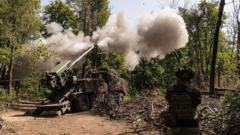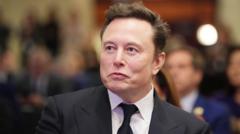Will the UK and Allies Support Ukraine Before and After a Peace Deal?

Published: 2025-09-04 01:21:04 | Category: technology
The ongoing conflict in Ukraine has drawn significant international attention as the UK and its allies prepare to support Ukraine in negotiations aimed at ending the war. UK Defence Secretary John Healey has stated that allies are committed to ensuring Ukraine's safety in the air, at sea, and on land, contingent upon a peace agreement. However, defiance from Russian President Vladimir Putin raises concerns about the prospects for peace, as he insists on continuing the invasion. This article explores the current situation, the international response, and the implications for Ukraine and its allies.
Last updated: 21 October 2023 (BST)
Key Takeaways
- The UK and its allies are ready to support Ukraine in peace negotiations.
- Russia continues its military aggression, with Putin vowing to carry on the invasion.
- International leaders, including Donald Trump, are involved in discussions surrounding the conflict.
- Recent Russian attacks have caused significant civilian casualties in Ukraine.
- The Coalition of the Willing is preparing to offer security guarantees for Ukraine.
The Current State of Affairs in Ukraine
As the conflict in Ukraine enters its second year, the situation remains tense. UK Defence Secretary John Healey recently addressed the media in Kyiv, reiterating the commitment of Ukraine's allies to support the nation. This support includes post-conflict measures aimed at providing security and ensuring a lasting peace. Healey's comments come just as Russian President Vladimir Putin, in a message conveyed from China, insisted that Russia's military actions would continue unabated.
Healey expressed confidence that the pressure on Russia is mounting and that the country is feeling the effects of international sanctions and military support for Ukraine. He highlighted the importance of continued aid, noting the UK's recent decision to direct £1 billion of seized Russian assets towards military support for Ukraine. This move, described as "Putin's dirty money returned with interest," underscores the UK’s strategy to economically and militarily bolster Ukraine.
Putin's Defiance and the Challenge of Peace Talks
Despite the international community's efforts, Putin has remained defiant, suggesting that he sees a "light at the end of the tunnel" but also warning that military solutions may be necessary if diplomatic efforts fail. His rhetoric continues to include demands that Ukrainian authorities address what he calls discrimination against ethnic Russians—a justification he has used throughout the conflict.
In a recent interview, Putin downplayed the significance of a potential meeting with Ukrainian President Volodymyr Zelensky, stating, "Is there any point? Let's see." His dismissive tone reflects the ongoing stalemate between the two nations, with Ukraine adamant that its sovereignty and territorial integrity must be respected.
The Role of International Leaders
International leaders play a pivotal role in shaping the response to the conflict. US President Donald Trump has faced criticism for his approach towards Putin, with some suggesting he is too lenient. However, Healey commended Trump for facilitating dialogue and not closing off options for negotiations. This highlights a complex dynamic where leaders must balance diplomatic engagement with a firm stance against aggression.
French President Emmanuel Macron has also been active in fostering discussions among allies, suggesting that a coalition is forming to provide security guarantees for Ukraine. This Coalition of the Willing, as it has been termed, aims to ensure that Ukraine is supported militarily and economically as part of any peace agreement. The coalition is reportedly waiting for confirmation from the US that it will act as the ultimate backstop in this endeavour.
Military Developments and Civilian Impact
As negotiations unfold, the violence in Ukraine shows no signs of abating. Russian aerial attacks have escalated, with reports indicating that over 500 drones and 24 cruise missiles were launched at Ukraine in a single day. These attacks have devastating consequences for civilians, as evidenced by a recent missile strike on a residential building in Kyiv that resulted in 22 deaths, including children. The human cost of the conflict continues to rise, prompting urgent calls for a ceasefire and renewed peace efforts.
Survivors of these attacks express deep frustration and anger towards the ongoing conflict. Individuals like Ihor Maharynsky, who lost his wife in a missile strike, voice their disbelief at the lack of strategic targets in the affected areas, highlighting the indiscriminate nature of the violence. Such sentiments are echoed across the country as many Ukrainians grapple with the reality of their precarious situation.
International Commitments and Future Prospects
The international community remains committed to supporting Ukraine, with plans for additional military aid and training for Ukrainian forces. However, the prospect of foreign troops being deployed to Ukraine remains uncertain, with countries like Germany expressing caution about sending soldiers to police any future peace. The focus, according to officials, is on securing a ceasefire—a goal that continues to elude negotiators.
As the Coalition of the Willing prepares for a crucial meeting, the emphasis will likely be on solidifying commitments to Ukraine's security and ensuring that any peace deal is backed by substantial international support. The ongoing discussions reflect a broader understanding that lasting peace will require collective action and a unified front against aggression.
The Road Ahead
Looking ahead, the situation remains fluid, with many uncertainties surrounding the potential for peace. While leaders express optimism about finding a resolution, the stark reality of the ongoing conflict serves as a reminder of the challenges ahead. The international community must remain vigilant and proactive in its support for Ukraine, as the stakes are high and the consequences of inaction could be dire.
Conclusion
The conflict in Ukraine continues to be a focal point for international diplomacy and military strategy. As the UK and its allies prepare to support Ukraine in negotiations, the defiance from Russia adds a layer of complexity to the situation. The international community's commitment to standing by Ukraine is crucial, but the road to peace is fraught with challenges. Will the combined efforts of global leaders be enough to bring about a lasting resolution, or will the conflict continue to escalate? The answer remains uncertain, but one thing is clear: the world is watching closely.
FAQs
What is the Coalition of the Willing?
The Coalition of the Willing is a group of nations committed to supporting Ukraine militarily and economically in its efforts to defend against Russian aggression and secure a peace deal.
What are the implications of the recent missile strikes in Ukraine?
Recent missile strikes have resulted in significant civilian casualties and underscore the urgent need for a ceasefire and renewed peace negotiations between Ukraine and Russia.
How is the UK supporting Ukraine?
The UK is providing military aid, including £1 billion from seized Russian assets, and has pledged to help train and equip Ukrainian forces as part of its commitment to support Ukraine in the ongoing conflict.
What role does the US play in the negotiations?
The US is a key player in negotiations, with its leadership seen as essential in providing security guarantees for Ukraine and facilitating dialogue with Russia.
What are Putin's demands for peace?
Putin's demands include addressing what he describes as discrimination against ethnic Russians in Ukraine, which he claims justifies the invasion. His maximalist stance complicates the peace process.



